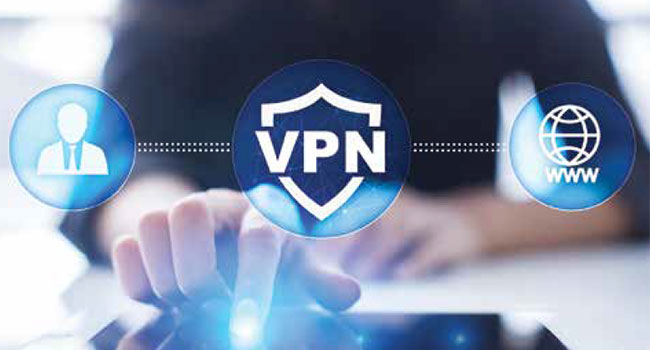
Flying Under the Radar
Business travelers need to maintain secure connectivity
- By Julian Weinberger
- Sep 01, 2018
With the high availability
of today’s mobile
network coverage and
accessibility to public
Wi-Fi hotspots, secure
connectivity is often
overlooked by traveling professionals.
While enterprises and small businesses
encourage employees to stay productive
by working on the road, connecting to
corporate networks while traveling substantially
increases potential security
risks including device theft, state-sponsored
surveillance, or data interception
from a man-in-the-middle attack while
using a public Wi-Fi hotspot.
To counter this, companies need a mobile
strategy that secures business communications
on the device, in transit and
when stored. IT departments also need to
carefully consider public hotspot security
to prevent breaches of sensitive corporate
data. Threats from public hotspots can
be dramatically reduced by using a personal
firewall and a virtual private network
(VPN). Additionally, digital containers can
be used to protect data, like a virtual safe,
and only release data once a secure connection
is established to the company network.
Security Best Practices
Mobile device security is very often the
hardest area for companies to control, especially
in bring your own device (BYOD)
environments where security is down to
the choice of the individual device owners.
Before traveling, employees should be
instructed in security best-practices such
as enabling two-factor authentication, remote
wipe, keeping software up-to-date,
staying away from unsecured Wi-Fi connections,
disabling Bluetooth discovery
mode, and encrypting corporate data.
Employees should also avoid downloading
apps from untrustworthy sources as
many apps carry embedded malware and
spyware that infringe privacy and share
device data with unauthorized parties.
When connecting to company networks,
a secure VPN should always be
used. A VPN automatically authenticates
remote users whenever they connect with
the company’s IT services. It creates a
private tunnel between the user and the
network shielding company confidential
data from potential onlookers while using
public Wi-Fi in malls, train stations and
hotels during business trips. Allowing remote
employees to send confidential company
data privately, a VPN can encrypt
web browsing activity and mask the IP addresses
to prevent tracking and snooping.
Last year, analysts at Forrester published
a report detailing how professionals
can prevent cybertheft while traveling. In
the “Best Practices for Minimizing Business
Travel Risk” report, companies are
advised to develop a three-stage check list
for their traveling employees to help minimize
security risks. Before departure, the
Forrester report recommends enabling full
encryption on all digital devices, deactivating
USB ports, deploying VPN connectivity
and installing management tools to
allow devices to be wiped remotely should
they be stolen.
IT professionals are also given tips that
employees should follow during the trip.
This includes briefing them on any local or
border customs and to always to be on the
lookout for suspicious behavior. Finally,
Forrester counsels on steps to complete
when a trip is over such as drawing up and
ticking off a post-trip checklist, holding a
de-brief meeting with the employee (even
if nothing went wrong) and making sure
company policies are up to date.
End-to-End Encryption
Certain industries have always been heavily
regulated. Healthcare, retail, legal and
financial organizations, for example, have
to comply with regular checks to prove the
privacy of the customer data handled has not been put at risk. The most popular way for these organizations
to privately share sensitive data is to use end-to-end encryption
(E2EE). E2EE protects data in transit by encrypting it to
make the content unintelligible.
Therefore, only the sender and the legitimate recipient of the
message possess the unique keys to unlock the information. Even
if a third-party were able to eavesdrop on the network communication,
the information itself would be indecipherable.
The introduction of new compliance standards, like General
Data Protection Regulation (GDPR) in Europe, is driving the
need for businesses of all industries and sizes to embrace E2EE
for their communications. It’s an approach that ensures mobile
communications stays private and dramatically reduces the risk
of a data breach.
Advanced Authentication
One of the strongest mobile device authentication technologies
available today is biometric mobile authentication. As biometric
authentication methods and technologies are based on a physical
characteristic of the user, they are extremely difficult for an
attacker to copy. Forms of biometric authentication include fingerprint
authentication, voice recognition, facial recognition and
retinal scanning. Companies should advise employees to implement
biometric authentication on each and every device that will
access the corporate network as it provides an extra layer of protection
and prevents unauthorized users from using devices.
Businesses are adjusting their security posture to bring it into
line with the modern way of working. It’s no longer a question of
managing employee access based on where they sit, it’s more important
these days to be able to authenticate them automatically
based on the device and the software they are using.
While connecting digital devices to corporate networks during
business trips has become an accepted part of everyday working
life, the number of ways in which sensitive company information
could be lost or stolen while traveling is growing. The most secure
path is to provide employees with a company-managed professional
remote access VPN that automatically encrypts data communications
and shields web browsing activity and IP information
from hackers.
A professional VPN automatically opens up an end-to-end
encrypted tunnel between mobile device and company network
that maintains the integrity of all data communications—keeping
it private and secure. Implementing strong passwords, antivirus
software and spam filters will also prevent many unnecessary incidents.
By implementing these security strategies, employees will
be able to effectively fly under the radar wherever their business
travels take them.
This article originally appeared in the September 2018 issue of Security Today.